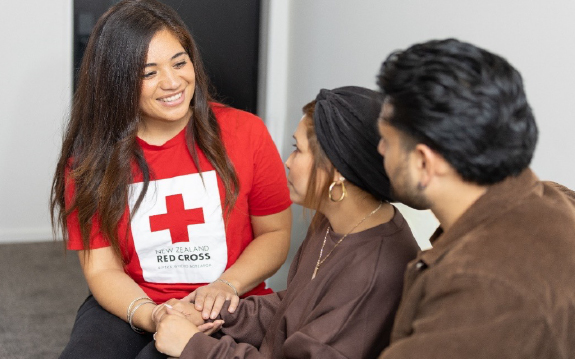News from the Ground | Resettlement in Invercargill
1. A brief history of refugee resettlement in Invercargill – when, who and how many
New Zealand Red Cross is one of six organisations providing community settlement support to former refugees who have arrived under the annual government quota system. Invercargill became a refugee resettlement location in 2018 as part of New Zealand’s expansion of the refugee settlement programme into more regions. Since the first families arrived in March 2018, we helped 466 former refugees from Colombia and the Democratic Republic of Congo to make Invercargill their new home by 31 March 2025. This marked a new chapter for Invercargill, embracing cultural diversity and offering a fresh start for those who had come through a long and tough journey as refugees.
2. A brief overview of the work with refugee communities
We are dedicated to helping former refugees rebuild their lives and establish a sense of belonging in Invercargill. Our work begins before families even arrive in the community. A team of volunteers ensure that each house is thoughtfully set up with essential items like bedding, crockery, cushions, cooking pots, and toiletries. We also add personal touches, such as soft toys, books, or artwork for children, based on their interests and ages. Utilities, including electricity, are connected ahead of their arrival, so their new home is ready and welcoming.
When families arrive, we meet them at the airport and take them to their homes, where we hand over the keys and help take photos for them, capturing the moment of entering their new home.
The first six weeks are task-intensive, involving essential activities like appointments with the Ministry of Social Development (MSD), enrolling children in school and arranging uniforms, registering with a GP, purchasing whiteware, and setting up internet services. These initial steps lay the groundwork for their new lives.
Our support doesn’t stop there. Each family is paired with a Key Worker who provides assistance for at least 12 months and, if necessary, up to two years. This ongoing support helps families navigate any challenges that arise and ensures they feel supported throughout their settlement journey.
Our Pathways to Employment service offers individualised programmes that recognise that every former refugee has unique skills, needs and career goals. The employment support team help former refugees throughout their journey to employment – we help them plan their education and training, work out their career goals and then ultimately, find work. Our team can help former refugees:
• Find and apply for jobs that match their skills.
• Plan for career and goals.
• Support into training, study, or work experience opportunities.
• Write CVs and cover letters.
• Prepare for job interviews.
• Talk to employers.
Our Pathways to Employment team has helped 256 people in Invercargill since the settlement began in 2018.
We closely work with English Language Partners, the Ministry of Social Development (MSD), Ministry of Education (MoE), Jubilee Budgeting, Family Works, NZ Police, Community Law, Sustaining Tenancies (Methodist Mission), StudyLink, YMCA, JR McKenzie Trust, the Salvation Army, Emerge, Frontline, Drive My Life, Well South, local churches, and local rental agencies.
3. The contributions of refugee background individuals and families to Invercargill (and New Zealand)
Former refugees bring different cultures, languages, and traditions, making New Zealand a richer and more interesting place to live.
People from refugee backgrounds come from a wide variety of backgrounds, countries and religions. They bring cultural, economic and social diversity and richness to our country, as well as skills and experiences from which we can all learn.
Former refugees who have settled in Aotearoa New Zealand include Members of Parliament, champion cyclists, internationally recognised businesspeople, poets, award-winning bakers, nurses, international humanitarian aid workers, mental health advocates, actors, restaurant owners and artists.
Former refugees play a vital role in addressing skill shortages and meeting the needs of New Zealand's changing economy. They bring valuable skills essential for industries like healthcare, education, and farming. These individuals not only help fill job gaps but also contribute to keeping businesses thriving in areas where their talents are most needed.
Former refugees help create stronger and more caring communities. Their stories encourage and inspire everyone to support inclusion and belonging. With meaningful participation in community life, they help build a more connected and resilient Invercargill for future generations.
4. What does ‘Community as a Superpower’ mean to you?
‘Community as a Superpower’ shows amazing strength that comes from people supporting one another. It’s about inclusion, kindness, and understanding that together we can achieve so much more. For refugee communities, it means being welcomed as friends and neighbours, not as strangers.
A city like Invercargill can change lives by offering more than just shelter; it can create connections, dignity, and hope. When communities open their hearts and work together, they not only help others but also grow their own strength and liveliness.
It can take time for former refugees to feel safe again, get used to new systems and a new culture, learn ‘Kiwi’ English, build networks and find employment, but having the support of the local community makes it easier. You can support former refugees by volunteering as a Refugee Support Volunteer to help support a new family as they settle.
Find out more on our website: www.redcross.org.nz/get-involved/volunteer-in-new-zealand/find-a-volunteer-role/refugee-support-volunteer
Contributed by Red Cross - Invercargill
